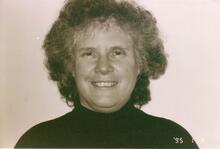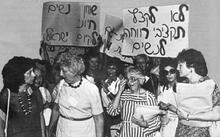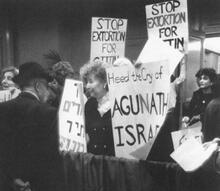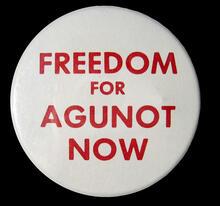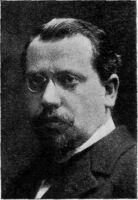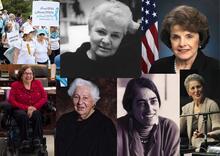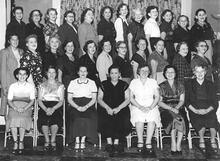Norma Baumel Joseph
Norma Baumel Joseph was born in Brooklyn, New York, in 1944 into a family of Eastern European immigrants. After receiving her PhD in religion from Concordia University in Montreal in 1995, she served as the director of various university-level programs and departments pertaining to Jewish studies, women’s studies, and religious studies. Joseph has published widely in scholarly books and journals and is highly regarded in Canada and internationally as an expert on Jewish women and on feminism. She is also an influential activist; she has done extensive community work that includes advocating for Agunah rights, creating an Orthodox women’s prayer group, and co-founding Women of the Wall. Joseph has served on the boards of many important organizations that advocate for women’s rights in religious spaces.
Dr. Norma Baumel Joseph is Professor of Religions and Cultures at Concordia University in Montreal; she also helped in the founding of the Concordia Institute for Canadian Jewish Studies, where she remains an associate, and founded and was the Co-director of the Azrieli Institute of Israel Studies. She also previously served as the Director of the Women and Religion specialization at Concordia. The author of numerous publications, conference papers, invited papers, and colloquia, Joseph has received many awards and grants in recognition of her scholarly talents. Nonetheless, her foremost motivation lies in teaching: "Teaching is my central focus and commitment. I have not shifted away from that primary dedication since I began at Concordia" (ACJS Team). Joseph is praised by her students as a highly skilled educator with an engaging, student-centered approach to teaching.
Family and Education
Joseph was born on October 12, 1944, in Brooklyn, New York, the second daughter of Moishe (Murray) Baumel (b. Austrian Poland, 1912, d. New York, 2001), a salesman who came to the United States as a child, and Madeline (Kohn, b. Hungary, 1917, d. Florida, 2014), a typist-secretary who came to the United States as an infant. She had one sister, Elaine (1941-2021). Many members of Joseph’s family engaged in religious occupations. Her paternal grandfather was Rabbi Joshua Baumol, author of Emek ha-Halakha; her maternal grandfather, Mordecai Kohn, was a sofer (scribe). Her mother’s half-brothers were Harry Wohlberg, an Orthodox rabbi, and Max Wohlberg, a Conservative cantor.
In 1965, Joseph married Rabbi Howard Joseph (1940-2021), who assumed the pulpit of Montreal’s Spanish and Portuguese Synagogue, Canada’s oldest congregation, five years later. The Josephs had four children: Leora (b. 1968), Rabbi Joshua (b. 1971), Ami (b. 1975), and Naphtali (b. 1976).
Joseph received her early education in Brooklyn, including a BA from Brooklyn College (1966). She undertook graduate studies at the City University of New York and earned a PhD in Religion from Concordia University (1995), where she has taught since 1974. Her dissertation, “Separate Spheres: Women in the Responsa of Rabbi Moses Feinstein,” was nominated for the Governor General’s Gold Medal Award for Excellence (1995).
Teaching Positions
Joseph served as a visiting professor at the State University of New York at Albany (1981) and at Brandeis University (1999–2000), where she was connected to the Near Eastern and Judaic Studies Department and to the Hadassah International Research Institute on Jewish Women. At her home university she has served as director of the MA Program in Judaic Studies (1989–1990, 1995–1998); convenor of the Chair for the Concordia Institute for Canadian Jewish Studies (1994–1997); director of the undergraduate Women and Religion Specialization; director of the Doctoral Program in Religion (2000–2003); and chair of the Department of Religions and Cultures (2003–2007). She also instituted a for-credit internship at the Alex Dworkin Canadian Jewish Archives.
Scholarship
Joseph is highly regarded in Canada and internationally as an expert on Jewish women and on feminism. Her extraordinary scholarship is due in part to her mastery of both traditional rabbinic sources and anthropological methods, a mastery apparent in articles on women and prayer, the Synagogue partition between men and womenmehizah, and the Lit. "daughter of the commandment." A girl who has reached legal-religious maturity and is now obligated to fulfill the commandmentsbat mitzvah. She has utilized her expertise in The legal corpus of Jewish laws and observances as prescribed in the Torah and interpreted by rabbinic authorities, beginning with those of the Mishnah and Talmud.halakhah in her academic work on Jewish divorce in Canada, including an article in Studies in Religion (2011) and as a collaborator on a recently awarded SSHRC grant project, “Troubling Orthopraxies: A Study of Jewish Divorce in Canada.” She serves on the editorial board of Women in Judaism, an electronic journal; on the advisory board of the Journal of Religion and Culture; on the Jewish Women’s Archives’ Academic Advisory Council; and on the Editorial Board for the Shalvi/Hyman Encyclopedia of Jewish Women.
In 1995, Joseph received the Leo Wasserman Prize for the best article published in American Jewish History that year for “Jewish Education for Women: Rabbi Moshe Feinstein’s Map of America.” In 2019, she received the Louis Rosenberg Canadian Jewish Studies Distinguished Service Award, in recognition of her commitment to the highest standards of scholarship, creative and effective dissemination of research, and activism in a manner without rival in the field of Canadian Jewish studies, in addition to being a respected voice in Jewish feminist studies more broadly.
Displaying nuance, incisiveness, and creativity in her scholarship, Joseph has made important contributions to the history of Iraqi Jews in Canada, the history of food in the Jewish community, and the lives of Jewish women in Canada. According to her, “[F]oodways are cultural highways. Food patterns communicate symbolic meanings and contain cultural codes, functioning to maintain ethnic and national identities” (Joseph, “T’beet). Her SSHRC-funded ethnographic research has led to publications such as “From Baghdad to Montreal: Food, Gender and Identity” (2011), “Cookbooks are our Texts: reading an immigrant community through their cookbooks” (2016), and “T’beet: Situating Iraqi Jewish Identity through Food” (2017). Joseph came to writing about food through her work on Iraqi Jewish women in Montreal. “It appeared to offer a uniquely suitable access to their experiences in Baghdad, as well as in Canada,” she writes. “The women were most willing to talk about food and recipes… Talking about religion… did not, at that time, engage their interest.” Delving further into the realm of food, Joseph drew out its multiplicities of connections and interactions, writing, “[P]robing the ways in which Iraqi Jews speak of their past and celebrate their existence underscored the importance of food. It is a central mode of discourse and a symbol of all that is good and much that is lost” (Joseph, “T’beet”).
Joseph’s work in film has reached a wide audience. She has appeared in two films: Half the Kingdom (1989) and Untying the Bonds … Jewish Divorce (1997). For Half the Kingdom, which depicts the formation of the group Women of the Wall, she also served as a consultant, and co-authored the guidebook that accompanied what became one of the most important Canadian documentaries on a Jewish theme ever made (ACJS Team). She began writing a regular column on Jewish life for the Canadian Jewish News in 2004.
Activism and Communal Work
Joseph has made important contributions to Jewish communal life through her work as an activist. As a founding member and Vice-President of the Canadian Coalition of Jewish Women for the Get (Jewish divorce), she worked with the community and the Canadian federal government for passage of a 1990 law that assists Jewish women whose husbands are unwilling to grant them a religious divorce (agunot). The Canadian Orthodox establishment has exhibited considerable resistance to change in this area. She was also one of the founders (1992) and was previously president of the International Committee for Agunah Rights (ICAR) representing Canada, with Alice Shalvi representing Israel and Rivka Haut representing the United States (Zylberberg). An agunah is a woman “chained” to a husband either unwilling or unable to grant her a Jewish divorce; since halakhah (Jewish law) requires that the get (the divorce document) be granted by the husband, an agunah cannot remarry, and if she has any subsequent children they are considered mamzerim (illegitimate children) (Zylberberg). Since 1997, the international element of the coalition has decreased; while ICAR still includes member organizations from other countries, its primary focus now is on Israel (Zylberberg).
Joseph founded Montreal Women’s Tefilah Group in 1982, a women’s prayer group that has met monthly in Orthodox synagogues for decades, an unusual accomplishment in the Orthodox world. The group continues to meet every The new moon; the first day of the month; considered a minor holiday, especially for women.Rosh Hodesh, as well as every Holiday held on the 14th day of the Hebrew month of Adar (on the 15th day in Jerusalem) to commemorate the deliverance of the Jewish people in the Persian empire from a plot to eradicate them.Purim to read Megillat Esther.
Joseph is also a founding member and former co-director (1989-2009) of the International Committee for Women at the Kotel (Women of the Wall), a group dedicated to securing prayer privileges for women at the Western Wall in Jerusalem, one of Judaism’s most sacred sites. The original founders of Women of the Wall included Bonna Devora Haberman and Rivka Haut, who first suggested in 1988 to Joseph and other women that they should pray at the Kotel with Torah she-bi-khetav: Lit. "the written Torah." The Bible; the Pentateuch; Tanakh (the Pentateuch, Prophets and Hagiographia)Torah and Four-cornered prayer shawl with fringes (zizit) at each corner.tallit, initiating a long legal battle, which led to a 2003 Israeli Supreme Court decision that they had a right to pray at the Kotel. However, the question of whether the government could set up a different location, rather than allowing the women to pray in the women’s section of the Kotel, remained. This issue eventually led to a split within the group, as the original members remained determined to pray in the women’s section of the Kotel, and so distinguished their group as Original Women of the Wall. Women of the Wall became a separate group led by Anat Hoffman, who made an agreement with the government to move the group’s prayer to Robinson’s Arch. Because the Robinson’s Arch site is open for egalitarian prayer and Orthodox members of Women of the Wall are not comfortable in an egalitarian setting, in solidarity Original Women of the Wall is committed to the group’s original goals (Birkner Mack). Furthermore, Joseph points out that “the Kotel is a national heritage site, not a Haredi shul even though it has been structured that way. It should belong to all Jews, to pray and sing and even dance like Miriam at the Red Sea.” Members of the Original Women of the Wall continue to petition the Israeli Supreme Court to recognize the rights of women to read from a Torah Scroll at the Kotel (Birkner Mack).
Joseph served on the governing board of Edah (1997-2004), the grassroots North American organization of modern Orthodoxy. Since 1996 she has served on the board of the Jewish Orthodox Feminist Alliance (JOFA). She has served as a national board member for the Canadian Jewish Congress (2006) and as a trustee for Canadian Jewish Congress Charities. She chaired a sub-committee convened by Parks Canada in 2005 when its Commemorative Places section was searching for content relating to Canadian Jewish women. She was a consultant for Auberge Shalom, a shelter for Jewish women, from 2005 to 2008. Her communal work has been recognized by the National Council of Jewish Women (Montreal chapter), which chose her as its Woman of Distinction in 1998; by the Montreal Jewish community, which presented her with the Jacob Zipper Education Award in 2000; and by Jewish Women International, from which she received the Leading Light, Woman of the Year Award in 2002. In 2021, The National Council of Jewish Women of Canada, Toronto, recognized Joseph as a contributor to Canadian Jewish Heritage Month.
In 1999 Dr. Joseph was appointed Chair of the Archives Advisory Committee for the Alex Dworkin Canadian Jewish Archives and has remained in the position since then. Since 2020 she has served as a member of the Lowy Advisory Committee for the Jacob M. Lowy Collection of Judaica and Hebraica for the Library and Archives of Canada.
Selected Works by Norma Baumel Joseph
“Mehitza: Halakhic Decisions and Political Consequences.” In Daughters of the King: Women and the Synagogue, edited by Susan Grossman and Rivka Haut, 117–134. Philadelphia: Jewish Publication Society, 1992.
“The Feminist Challenge to Judaism: Critique and Transformation.” In Gender, Genre and Religion: Feminist Reflections, edited by Morny Joy and Eva K. Neumaier-Dargay. West Waterloo, Ontario, Canada: Wilfrid Laurier University Press, 1995.
“Hair Distractions: Women and Worship in the Responsa of Rabbi Moshe Feinstein.” In Jewish Legal Writings by Women, edited by Micah Halperin and Hannah Safrai, 9–22. Jerusalem: Urim Publications, 1998.
“Jewish Women in Canada: An Evolving Role.” In From Immigration to Integration, the Canadian Jewish Experience: A Millennium Edition, edited by Ruth Klein and Frank Dimant, 182–195. Toronto: Institute for International Affairs, B'nai Brith Canada, 2001.
“Listening to the Voice of Women: Halakhic and Political Considerations.” In Women of the Wall: Claiming Sacred Ground, edited by Rivka Haut and Phyllis Chesler. Woodstock, Vermont: Jewish Lights, 2002.
“Women in Orthodoxy: Conventional and Contentious.” In Women Remaking American Judaism, edited by Riv-Ellen Prell, 181-209. Detroit: Wayne State University Press, 2007.
“Food, Gift, Women Gift-Givers: A Taste of Jewishness.” In Women, Religion and the Gift: An Abundance of Riches, edited by Morny Joy, 129-138. Volume 17, Sophia Studies in Cross-cultural Philosophy of Traditions and Cultures. Switzerland: Springer, 2017.
“Women’s Rights and Religion: Jewish Style.” In Explorations in Women, Rights and Religions, edited by Morny Joy, 138-154. Sheffield: Equinox Publishing LTD, 2020.
ACJS Team. “Dr. Norma Baumel Joseph to Receive 2019 Louis Rosenberg Award.” Association for Canadian Jewish Studies Association Etudes Juives Canadiennes, December 20, 2021, https://acjs-aejc.ca/dr-norma-baumel-joseph-to-receive-2019-louis-rosenberg-award/
Joseph, Norma Baumel. “Why Should We Give Up the Kotel?” HBI Blog: Fresh Ideas from HBI, Hadassah-Brandeis Institute, Brandeis University, 14 July 2016, www.brandeis.edu/hbi/blog/2016/0714-why-should.html
Joseph, Norma Baumel. “Jewish Education for Women: Rabbi Moshe Feinstein’s Map of America.” American Jewish History. Special editor, Pamela Nadell. 83.2 (1995): 205–222.
Joseph, Norma Baumel. “From Baghdad to Montreal: Food, Gender & Identity.” In Migration, Communication & Home: Jewish Tradition, Change & Gender in a Global World, edited by Tanya Reyton-Marinchesshka,92-104. Sofia: LIK Publishing House, 2011.
Joseph, Norma Baumel. “Civil Jurisdiction and Religious Accord: Bruker v. Marcovitz in the Supreme Court of Canada.” Studies in Religion/Sciences Religieuses. Guest editor, Ira Robinson. 40.3 (2011): 318–336.
Joseph, Norma Baumel. “Cookbooks Are Our Texts: Reading an Immigrant Community through Their Cookbooks.” Religious Studies and Theology. Ed. Anne Vallely. vol. 35, no. 2, 2016, pp. 195-206. https://doi.org/10.1558/rsth.v35i2.32556
Joseph, Norma Baumel. "T’beet: Situating Iraqi Jewish Identity through Food." In Everyday Sacred: Religion in Contemporary Quebec, edited by Hillary Kaell. Montreal: McGill-Queen’s University Press, 2017.
Mack, Cheryl Birkner. “Original Women of the Wall: Fighting for Women to Pray at the Kotel.” The Jerusalem Post, Jan 23, 2023. https://www.jpost.com/western_wall/article-729334
Zylberberg, Sonia. "International Coalition for Agunah Rights (ICAR)." Shalvi/Hyman Encyclopedia of Jewish Women. 23 June 2021. Jewish Women's Archive. http://jwa.org/encyclopedia/article/international-coalition-for-agunah-rights-icar


